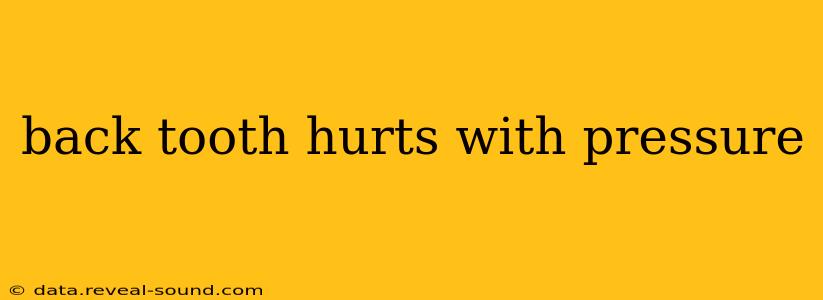A nagging ache in your back tooth that intensifies with pressure is a common dental problem, but pinpointing the cause requires understanding the potential culprits. This discomfort can range from a minor irritation to a significant dental emergency, highlighting the importance of prompt attention. This comprehensive guide explores the various reasons why your back tooth might hurt under pressure, detailing the symptoms, treatments, and when professional dental care becomes necessary.
What Causes a Back Tooth to Hurt With Pressure?
Several factors can trigger pressure sensitivity in a back molar. Identifying the root cause is crucial for effective treatment. Common culprits include:
-
Cavities (Dental Caries): These are the most frequent offenders. Bacteria erode tooth enamel, creating holes that expose the sensitive dentin layer beneath. Pressure exacerbates the pain as the exposed dentin is highly sensitive to temperature and pressure changes.
-
Cracked Tooth: A crack, even a tiny hairline fracture, can cause intense pain, especially when chewing or biting down. The crack may not be visible to the naked eye, requiring dental X-rays for proper diagnosis.
-
Abscess: A pus-filled infection at the root of the tooth. This is a serious condition characterized by throbbing pain, swelling, and sensitivity to pressure. Abscesses require immediate dental intervention to prevent the spread of infection.
-
Gum Disease (Periodontitis): Advanced gum disease can lead to inflammation and infection around the tooth root, causing pressure sensitivity and potential tooth loss.
-
Bruxism (Teeth Grinding): Chronic teeth grinding, often done unconsciously during sleep, can wear down tooth enamel and cause microscopic cracks, leading to pressure sensitivity.
-
Sinus Infection: Pressure from a sinus infection can sometimes radiate to the upper back teeth, causing pain that intensifies with pressure. This is more common in the upper molars.
-
Impacted Wisdom Teeth: Partially erupted or impacted wisdom teeth can cause pain and pressure on adjacent molars.
-
Dental Procedure Complications: Rarely, a previous dental procedure like a filling or crown might have complications, leading to sensitivity.
How is Pressure Sensitivity in a Back Tooth Diagnosed?
Your dentist will conduct a thorough examination to diagnose the underlying cause of your discomfort. This may involve:
- Visual Examination: A visual inspection of your teeth and gums.
- Dental X-rays: To detect cavities, cracks, abscesses, or impacted teeth.
- Dental Probes: To check for cavities and assess the depth of any damage.
- Percussion Test: Gently tapping on the tooth to check for sensitivity.
- Palpation: Feeling around the tooth and gums to detect swelling or tenderness.
What are the Treatment Options for a Pressure-Sensitive Back Tooth?
Treatment options depend entirely on the underlying cause:
- Cavities: Fillings are typically used to repair cavities and restore the tooth's structure.
- Cracked Tooth: Depending on the severity, treatment might range from a filling to a crown or even extraction.
- Abscess: Root canal therapy or extraction might be necessary, often followed by antibiotics to fight the infection.
- Gum Disease: Scaling and root planing (deep cleaning) are usually employed to remove plaque and tartar buildup.
- Bruxism: Treatment options include night guards to protect teeth while sleeping and stress management techniques.
- Sinus Infection: Antibiotics or other treatments prescribed by your physician will be needed to address the sinus infection.
- Impacted Wisdom Teeth: Extraction is often recommended to prevent further complications.
When Should I See a Dentist About My Pressure-Sensitive Back Tooth?
Don't delay seeking professional help if you experience:
- Severe pain: Intense, throbbing pain that doesn't subside.
- Swelling: Noticeable swelling in your gums or face.
- Fever: A high fever accompanies the toothache.
- Difficulty opening your mouth: Limited range of motion in your jaw.
- Pus or discharge: Pus coming from around the affected tooth.
Ignoring a painful, pressure-sensitive back tooth can lead to serious complications, including infection spread, tooth loss, and further dental health issues. Prompt diagnosis and treatment are crucial for preserving your oral health. Consult your dentist immediately if you are experiencing persistent discomfort.
Does a back toothache always mean a cavity?
No, a back toothache doesn't always indicate a cavity. As outlined above, several other issues, such as cracked teeth, abscesses, gum disease, bruxism, and sinus infections, can also cause pain in your back teeth. A thorough dental examination is necessary to pinpoint the precise cause.
Can a sinus infection cause pain in my back teeth?
Yes, a sinus infection can sometimes cause pain that radiates to your upper back teeth, especially the molars. The proximity of the sinuses to the upper molars means that pressure from a sinus infection can be perceived as tooth pain.
How long does it take for a back tooth to heal after a filling?
Recovery time varies depending on the procedure and individual healing rates. Minor discomfort might persist for a few days, but significant pain indicates a problem. Consult your dentist if the pain is severe or prolonged.
This information is for general knowledge and does not constitute medical advice. Always consult with a qualified dental professional for diagnosis and treatment of any dental issue.
